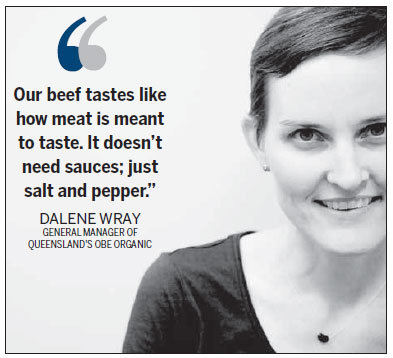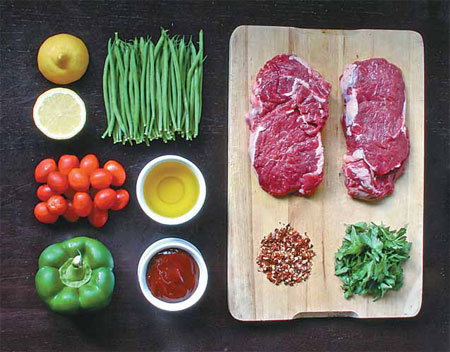High steaks
Updated: 2012-12-15 08:26
By Rebecca Lo (China Daily)
|
|||||||||||
|
OBE's organic beef is very lean, with the fat on the outside - unlike Wagyu beef which is marbled throughout. Photos Provided by Plug to China Daily |
Happy cows give the best meat, and in Australia's arid Channel Country, the free-roaming animals choose their own diet. Rebecca Lo finds out why it is some of the purest protein you can get in Hong Kong.
Dalene Wray says she is just glad to be where it is happening. In 2011 the general manager of Queensland's OBE Organic made Hong Kong her permanent home with her husband and daughter, after a stint in Beijing in 2009.
At the same time, she also set up the company's regional head office here to nurture new markets with her USDA organic certified beef.
"Living in Australia, it's hard to spot trends by only visiting this region," Wray explains. "There is so much opportunity to learn every day through conferences and events that may only happen once a year in Australia."
Wray is a firm believer in living and eating healthy.
She comes from four generations of farmers and grew up in Birdsville in Australia's Channel Country with 250 sq km of semi-arid grassland as her backyard. This vast area stretches from Queensland to certain parts of South Australia, the Northern Territories and New South Wales.
Her father, David Brook, is OBE's group chairman.
"We have 35,000 heads of cattle, about one head per square kilometer," she says. "The country is so arid that there is actually very little grass. My mother and father are both pilots - we have two planes to round the animals up with four to six people on the ground."
 |
Due to its bare 120 mm of annual rainfall, cattle raised in the Outback are not subjected to as many parasites as in wetter climes.
"There is less disease," Wray says. "The cattle choose their own diet. Channel Country is a unique region with plants that have special tastes, like our salt brush and pepper grass. If the cattle feel like going for a protein bush, they are free to do so. In a feed lot, the animal has no choice."
Wray is quick to point out that while organic products may not be more nutritious than their big corporation counterparts, that shouldn't be the reason for the choice.
"Our beef tastes like how meat is meant to taste," she says. "It doesn't need sauces; just salt and pepper. My favorite way to enjoy it is when my husband cooks it for me on the barbecue."
"The meat can be considered the opposite of Wagyu. Instead of the fat being marbled throughout, it is on the outside, making the red meat very lean. We have held tastings with local chefs and all have liked our products so far. People choose organic because it is guaranteed not to have bad things in them."
She has recently hosted Chinese organic inspectors in the Outback and aims to be certified by the end of this year to begin selling OBE products in China.
"Certification is a challenge," she admits. "Every country has different standards. Since China (the mainland) doesn't accept Australian standards, we had to fly them over so that they can inspect our products and resources themselves."
For the past six years, OBE products have been available in Hong Kong through upscale supermarkets, and although Wray has only launched OBE in the Middle East this year, she is already witnessing very positive response.
"The population is huge in the Middle East and there's only a four-hour time difference," she says. Sales to Southeast Asian markets, such as Malaysia and Indonesia, are also increasing because OBE beef is halal, or slaughtered according to Muslim requirements.
Wray believes that through working with local chefs, she can have a better understanding of how her products can be integrated into local dietary demands. In the end, she says, it is all about offering more choices to educated consumers.
"I don't want to make people feel guilty for not eating organic," she says. "I understand that it can be expensive. Organic eggs, for example - I think they taste better and I feel better giving them to my daughter. Everyone should have choice in their lives and they can make their own decisions about how they want to eat."
Contact the writer at sundayed@chinadaily.com.cn.
Today's Top News
Rescuers race against time for quake victims
Telecom workers restore links
Coal mine blast kills 18 in Jilin
Intl scholarship puts China on the map
More bird flu patients discharged
Gold loses sheen, but still a safe bet
US 'turns blind eye to human rights'
Telecom workers restore links
Hot Topics
Lunar probe , China growth forecasts, Emission rules get tougher, China seen through 'colored lens', International board,
Editor's Picks

|

|

|

|

|

|






